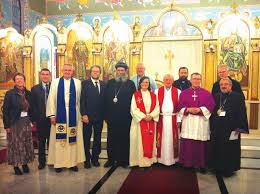The goal of ecumenism (objective organic unity of Christian denominations) has been
highly elusive for the church. During the last half of the twentieth century
many Christian denominations have made great effort to develop closer
relationships and understandings. Mergers were realized among groups such as
the Methodists, Presbyterians and Lutherans. Still, ecumenism remained an
un-ending series of high hurdles to cross over (as was the case with plenary
sessions of the Consultation on Church Union 1960). I believe ecumenism as we
envision it to be will continue to be elusive in America, especially since the
idea of America has been built upon pluralism and the freedom of religion. It
is Christ’s wish that we come together (Jn. 17:21), though the path is difficult
(not impossible).
Matters of doctrine and the
practice of theology is a good start – justification by faith and the
sacraments are two topics that have divided the church for decades. And since
America can still be described as having a ‘quest culture,’ the church can seek
common ground on issues such as liberty in worship versus ‘an American Christianity,’
matters of justice and care for the less fortunate, active involvement on
social issues without going too far left or right, the role of women in the
church and ordination, and combined efforts at worldwide evangelism. With
continued growth as a result of immigration and globalization, changes in
migration patterns, the increased practice of Christianity in regions like
Africa, Latin America and the Caribbean, there will be need of multicultural
exchanges regarding the practice of religion in these diverse societies. Will the western model of Christianity be
continually forced upon these new or maturing cultures? What of culture? It would seem that the liberal agenda has
sunk its teeth deep into the heart of both first and third world nations. And
what’s left of traditional nations may be slowly infected with liberal views
with the increasing availability of the internet and media. Of course, this provides a platform for
expansion of the gospel. A degree of ecumenism provides this type of
conversation- whether among the different Christian denominations or Christians
with non-Christians. It gets a bit sticky as the perception from these
gatherings may be a goal of “watering down” of orthodoxy. Still, ecumenical
movements will encourage “working together in more suitable patterns, more
creative environments and more faithful ministries of service.”[1]
A bad idea would be compromising
the gospel for the sake of peace, tolerance, relevance or convenience.
Pluralism defines America, but Christianity is foundational to its history. The
church must never give up on the call to be light in a dark world. Bad for
example is caving in to political correctness and banning use of “God/Jesus” in
official government prayers as witnessed in the past few years. Yes, there is a
separation of Church and State, but not to the point where prayers are offered
to just any God.
If there was one message that rang
clearly from this week’s studies, it was that the church of the 19th
and 20th centuries made their positions known to the world. Their
voices rang loud and clear on matters which affected the Christian community
and beyond. This meant working together or against worldviews, government,
religions or individuals. In September
(2018), the World Council of Churches (WCC) sponsored an ecumenical event in
the form of the Conference on World Mission and Evangelism held near Athens.[2]
Kobia posited that this year’s event had the best representation from Catholics
and Pentecostals since attempts at ecumenism. Another example is ongoing
collaboration between the Vatican and the WCC in 2018 to address pressing
matters such as the refugee crisis, Christian unity, peace building, migration,
youth and the promotion of a “World Day of Prayer for the Care of Creation in
Assisi.”[3]
We need to work together. Christian witness is at stake. But at the same time,
we must keep in mind – No compromising core doctrinal beliefs. We have gone
much too long sitting on the sidelines and watching the world go by. How long
will liberal interests (even within Christian circles) dictate mainstream
Christian worldview? Action begins one family at a time within our local
congregations with church leaders who have been authoritatively appointed by
God to “Go..into ALL the world..”
[1] Samuel
Kobia, “Ecumenism in the 21st Century,” The Ecumenical Review, World Council of Churches, Vol.70 No.1
(2018): 3, accessed December 6,
2018, https://onlinelibrary-wiley-com.ezproxy.liberty.edu/doi/pdf/10.1111/erev.12329
[3] Francesca Merio, “Churches Collaborate for
Peace-building and Migration,” Vatican News, (Sept. 2018), accessed December 6,
2018, https://www.vaticannews.va/en/church/news/2018-09/catholic-church-jwg-wcc-meeting-germany.html

No comments:
Post a Comment